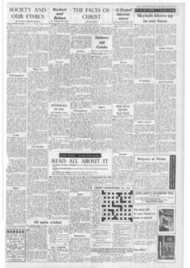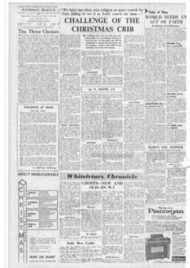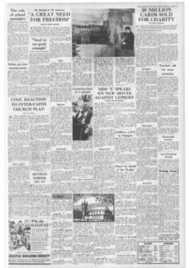Page 2, 21st December 1962
Page 2

Report an error
Noticed an error on this page?If you've noticed an error in this article please click here to report it.
Tags
Share
Related articles
Opus Dei 'secrecy' Exposed In Rome
Organisation's Irresistible Rise
Nothing Sinister About This New Hostel
The Darker Sides Of Opus Dei's Work
Church And Social Order In Spain
What We Think
OPUS DE1 AND SPAIN
-A STATEMENT
The Opus Dei members in government positions in Spain, whom Hugh Kay mentions in his recent articles, may be working for the new social order which he sees emerging in that country; they may be representatives of that new order; what they are not is representatives of Opus Dei. Opus Dei has publicly declared on several occasions that each of its members is perfectly free in his public or professional life to follow and work for the policies and ideals which he personally thinks best; and that, in doing so, he represents himself and in no way the Institute which offers its members no social Or political programme.
People do not come to Opus Dei seeking such a programme; if they do, they will not find it. What they will find is the challenge to live a life of renunciation and dedication to God in an effort to attain sanctity and spread Christian ideals in the midst of the world.
It follows that the members of Opus Dei do have certain aims in common, specifically two: to seek sanctity in everyday life and to do apostolate through their prayer. presence, work and example. This is the common denominator-a shared Christian ideal-which links the members. On top of this denominator each freely builds his numerator: his human personality, occupation or job, social interests, cultural tastes, political preferences, and so on. Given the present development of Opus Dei (it has members of all social classes and backgrounds, of all types of job and occupation, and from more than 50 different countries). the range of the numerators is almost limitless.
'Anonymity'
Hugh Kay speaks of Opus Dei belng "misunderstood". It certainly can be misunderstood if his article leaves the impression that most Opus Dei members in Spain are connected with the government or active in public life. He speaks highly of the Christian social sense and dedication of the 'Opus Dei men in the ministries'. It should be added however that not only do these men not represent Opus Dei, but the jobs and positions they hold are not even typical of those of the vast majority of its members. These members, in Spain or elsewhere, are engaged in the most ordinary occupations; many of them, for instance, are farm or factory workers.
Hugh Kay is, apparently, not aware that many Opus Dei members took part in another type of social action in Spain which he considers in passing: the recent Asturian miners' strikes. Those Miners who belong to Opus Dei and strike against the Government in Spain. are no more representative of the Institute than the
members who work as ministers in that same government. Yet, if anything, the way of life and, shall we say, the anonymity of the former are more typical of those of the great majority of Opus Dei members everyhere.
The word 'anonymity' has been used with full deliberation. Is it a loaded word? No doubt some people will try to Use it SO. There exists the anonymity of the anonymous letter the anonymity generally of the man who has something to be ashamed of, who wishes to cover up some dirty work. And there exists the anonymity of the anonymous donor the anonymity of the man who wants to do some good work, yet prefers to do it quietly and sees no need to have his name appear as if seeking public recognition or reward.
The members of Opus Dei do not profess to be better than other people. But they are trying to be better than themselves. For this purpose they make a personal and private consecration of their lives to God, through living the evangelical counsels white continuing in their everyday activities. One may not feel called to this dedication, but one will hardly question that it is a good work. They certainly are not ashamed of it. They do not hide their membership of Opus Dei and will deny it to no one.
At the same time they feel no call to broadcast it to the world. If some choose to read secrecy into the fact that they prefer to live their dedication quietly, then indeed there has been misunderstanding -a failure on the part of such people to understand what after all is not so strange or difficult or mysterious. Perhaps the same people also find difficulty in understanding Our Lord's hidden life when. for thirty years. he was no more than 'the carpenter's son'. Would they also say that this was 'impregnable secrecy' on the part of the Son of God?
Mysterious?
So, if one asks what the members of Opus Dei do, the answer is clear and simple. Humanly, they continue to do what they were doing before, they do what they probably would have done in any case if they had never joined Opus Dei: the bricklayer continues to lay bricks. the student to study, the doctor to attend to his patients, the postman to deliver letters. And off work, they visit friends, take part in local activities, play sports. read, write . . .
Supernaturally, on the basis of an intensive spiritual life and the dedication implied in the three vows, they ,ry to make love of God and zeal for souls the motive behind each aspect of this everyday activity, so that it will become
an effective part of the Christian leaven in the world.
Their lives can certainly be described as ordinary, even as very ordinary. One may, if one wishes, conclude that they arc not very exciting or interesting (one could be wrong). But can one reasonably suggest that such lives are mysterious or hard to understand?
The facts
In any case expressions such as 'impregnable secrecy' or 'they just won't talk' are just not true of Opus Dei. A list of over 250 newspaper and magazine articles and references giving good factual accounts of Opus Dei its aims, spirit and apostolates is available to anyone requesting it from the address below. The spirit and purpose in which members are formed are clearly set forth in 'The Way', a book by Mgr. J. M. Fecriva, Founder of Opus Dei, which can be found at bookshpps everywhere and has already gone into well over 1,000,000 copies in 30 translations
The corporate apostolates of Opus Dei activities run by the Institute in the spiritual, education or social welfare fields and ranging from student residences and retreat houses to summer camps and workers clubs are well known in each country where Opus Dei works and are detailed in articles supplied to anyone who seeks information directly from the Institute. The centres housing these apostolates are publicly known and open for anyone to visit; they are listed as are the Superiors of the Institute in the Ecclesiastical Directories of each country.
Positions
There remains the question of 'jobs for the boys' and the suggestion that the 'predominance' of Opus Dei men in Spanish Universities gives rise to complaints. 'Complaint' could mean very little; it could also imply very much. It could be that we are being told of a petty querulousness stemming from failure to make the grade in fair and open competition. But if it is implied that the complaints are fair, it follows that the competition was foul, in other words that the members of Opus Dei are not above dishonesty or fraud if such means help them attain influential positions or further their aims and interests.
Such charges are hardly to be made or repeated lightly. If they are made, prudence and elementary justice ask for them to be substantiated. And no responsible person will credit them until given clear evidence of their truth. A
Spanish magazine (which, rather obviously, has nothing to do with Opus Dei) writes: "To this day not a single case has been known of Opus Dei intervening in the free professional and political activities of its members by means of questionable patronage" (Revista Franciscano, Barcelona, April 1962). Surely the onu.s is on those who suspect or suggest otherwise of Opus Dei -or its members to produce the evidence?
In any case charges or hints of fraud and dishonesty will seem scarcely credible to anyone who reflects on the implications of the three vows lied by the members of Opus Del. They have committed themselves to a celibate life. renounced the free use of the world's goods and pledged their will to carrying out God's will in a life of obedience. Is it likely that such men. having given up so much out of love of God, should deliberately set themselves on the road to hell through an evident and grave sin against justice? They would have to be not only extraordinarily insincere about their vocation, but also incredibly blind and stupid regarding the plight of their very souls.
If people wish to set up a political or professional pressure group. there arc, after all, easier and more likely forms of association open to them that that of a Secular Institute. Most people will agree that to have to live the three evangelical counsels of poverty, chastity and obedience would be a rather high price to pay for membership in a political organization or a professional 'mutual aid' club.
Dedication
Opus Dei is something new in the Church, with roots nevertheless that go as far back as the dedicated groups living in the early Christian communities. If some find the concept of dedicated life in the midst of the world difficult to understand. time will make for understanding. Those who know a little of the history of the Church, of the opposition met by other well-known institutions in their early days, will not he surprised to see something similar re-occur from time to time.
And because they believe that the Holy Ghost is inspiring the development of the Church, they will go forward without loss of peace and without scandal, and with an echo of St. Paul's phrase in their mind: doing the truth, seeking the truth (and, as need arises, verifying the truth) in a spirit of charity.
The Secretariat of Opus Dei in Great Britain,
18 Netherhall Gardens.
N.W 3.
(Hugh Kay reph to this
statement in next week's issue.Editor),
blog comments powered by Disqus









